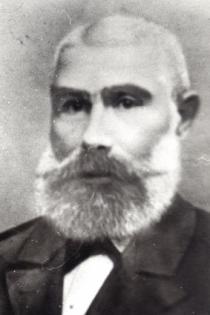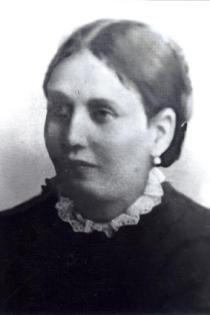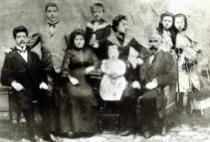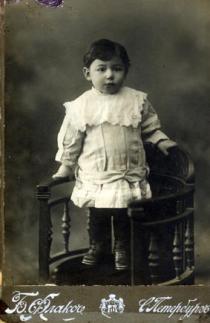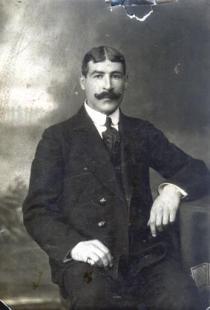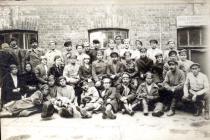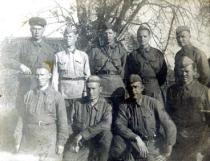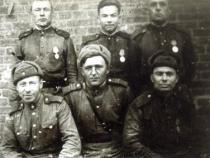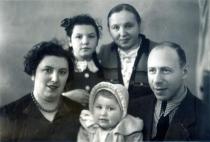
Isaac Rotman
St. Petersburg
Russia
Interviewer: Ksenia Senkevich
Date of interview: July 2005
I met Isaac Leybovich Rotman in his cozy one-room apartment in one of the new district of St. Petersburg. A lot of arduous trials fell to his lot: revolution, starvation, arrest of his father, war which he went through from the very first till the very last day. But despite of it Isaac Leybovich in his venerable age is more ready to laugh than to scold; he is very sociable and interested in outward things. His listener feels his sincere optimism and is surprised at accuracy of his memory, when Isaac Leybovich remembers past events.
Unfortunately I can tell you almost nothing about my great-grandmothers and great-grandfathers. My paternal great-grandfather’s name was David Rot. My paternal grandmother was Mina. She was born in Novgorod region in 1851, and died in 1922. Both my grandmother and grandfather spoke only Yiddish. Grandmother did not wear a wig and did not cover her hair. I know that they had a large family: 11 children. You should take into consideration that many children died at a very young age. I never saw any of them.
My maternal great-grandfather was named Abram Tush. His son (my mother's father) was Moske Tush, his wife’s name was Hayke. My maternal grandmother and grandfather lived in Staraya Ladoga. I used to spend time at them several years running. My grandfather was an owner of bakery, he made bread and sell it. Soviet authorities liquidated his bakery and grandfather himself, too. I do not remember details, but grandmother came to Petersburg soon after the Revolution 1 and lived at us. She spoke poor Russian, did not tell fairy tales. On the whole she did not become a grandmother for us in full sense of this word.
They had a nice small wooden house. There was no electricity supply, they used kerosene lamps. They heated their house with Russian stove 2, they also cooked food in it. They had no water supply, and brought water (by the way, very tasty water) from the well in the court yard. There were some furniture pieces inside (certainly), but we used to sleep on the floor. The town was very small; grandfather's shop was situated in its center, near the market building. We used to help him to bring bread from the bakery to the shop.
The house was surrounded by a small garden, full of old apple-trees. They produced poor crops. My grandparents had neither cattle nor domestic animals.
They had no assistants about the house. But in grandfather’s bakery, someone helped him for sure: otherwise he would have not managed.
My grandmother and grandfather were religious people. Grandfather wore kippah, grandmother bound her head by a kerchief, but she did not wear a wig. They always celebrated Sabbath and all holidays. They ate only kosher food. They visited synagogue, but I can't say with certainty how often. I guess not every day: their life was hard, it was necessary to work all day long.
I remember nothing about political views of my grandfather, but I know for sure that he was not a member of any political party. He was interested only in his work: he worked hard and loved to work hard.
He was not an educated person. I guess that he had finished two classes of cheder, not more.
And it goes without saying that my grandmother and grandfather never thought about going somewhere for vacation.
I can say nothing neither about their relations with neighbors, nor about their brothers and sisters.
I still keep a certificate given to my father which reads that he descended from a soldier's family. Therefore I make a conclusion that during some period of his life my grandfather served in the army.
I was born in St. Petersburg in 1912. It happened in the apartment near Fontanka River. Later when our family became larger, we moved to another apartment, situated nearby, in Voznessensky prospect. Till now I like to come there, to stand in the street and recollect my childhood and youth. We lived on the 3rd floor of the big stone building. It was surrounded by lots of trees. The pavement was made of wooden blocks. During the flood of 1924 all pavements went up and moved together. It was very terrible.
Several times I watched our tsar Nikolas II 3 passing by along our street to the Winter Palace. [Winter Palace was built by the architect B. Rastrelli as a residence for Russian tsars; nowadays it is one of the buildings occupied by the State Hermitage museum.] All passers-by stopped, men took of their headwear and shouted welcoming the tsar.
In my early childhood all transport was animal-drawn. In the streets there were carts, carriages, etc. In the Alexandrovsky market situated not far from our house, there was a special place where they sold everything necessary for horses and carts. When a child I liked to go there very much: all those things seemed to me an embodiment of beauty. Many people from the neighboring villages came there to buy goods. I always went to school through that market. I saw there many different things. I liked to lounge about the open second-hand goods market (they called it a flea market).
In Petersburg there lived many Jews. Our house was situated next door to the synagogue, and I often observed crowds of people which the synagogue hall could not seat.
It was a pleasure to watch the way Jews communicated with each other in the yard of the synagogue: endless conversations, atmosphere of total amiability and togetherness. All that impressed me greatly.
I guess that before the Revolution in Petersburg there were many synagogues and meeting-houses. I can judge from a meeting-house situated five minute’s walk away from the synagogue. But soon after the Revolution their number began to decrease promptly. There were also mikves, shochetim, and everything other necessary.
There were no special Jewish places of residence, Jews lived all over the city, but for some reason they often appeared to live within call. For example, in our house there lived several Jewish families.
There were no special occupations typical for Jews. Among them there were many tradesmen, but a lot of doctors and lawyers, too. And my uncle was a worker, a founder.
In the city there was electricity and water supply, but stove heating. People kept fire wood in special sheds near their houses.
I remember that my father went to synagogue. He took his children with him. I studied in cheder at that synagogue. I think that my father wanted to teach us. But Revolution came and (though during the first years under Soviet power there was no state anti-Semitism) they started struggling against religion. The synagogue was closed, cheder too. It happened approximately in 1920. And before that we celebrated all holidays in the synagogue, built sukkah in its court yard. My grandmother told us many-many times (until her death) how to celebrate holidays correctly. Till now I remember challot for Sabbath.
I have a hazy recollection of the Revolution of 1917. Our street witnessed interminable demonstrations. My basic memoir is big noise, shouts, singing out of tune. In 1924 I became a pioneer. I idolized Lenin 4. When he died, I sobbed violently several days without a break. My adoration was akin to unction. I was a permanent participant of demonstrations on May Day and during October holidays 5. It was very cheerful! We sang much. It is strange that I have forgotten all revolutionary songs of that time. I do not remember any manifestations of anti-Semitism. I still think that the main anti-Semites are not people who persecute Jews, but those Jews who betray their Jewish nature, changing their surnames and names to more harmonious in local style.
We did not go to the market: there was no need. All shops were situated near to our house. And I went to market for entertainment.
Political events did not concern us. But possibly parents did not want to discuss it with their children. As for me, I sincerely consider our country (the USSR) to be the best one in the world, I thought that I was extremely lucky to be born here.
My father’s name was David-Leyb Abramovich. You see that he had 2 names, therefore his children had different patronymics: Davidovich and Leybovich. They chose patronymic they liked more. He was born in 1880 in the Novgorod region. He was a very serious person, always very strict with his family members. He was a man of indisputable authority. He liked to talk with his friends: they came to us and held endless conversations about politics, trade, about everything. They seldom joked, spoke seriously and in details.
My father used to press his children (especially boys) very close. If only a girl complained of something trifling (for example, one of us had pulled her hair), we could not avoid punishment. Sometimes (and it often happened) he whipped us.
He finished only an elementary school. I think that his mother tongue was Yiddish, but his Russian was very perfect.
My father was an antiquarian. He mastered that profession himself and was an owner of an antique shop. Soon after the Revolution my father was arrested. Mum showed herself as a real hero: she visited some important persons, among them was Gorky 6. She also went to some ambassadors, who were father’s customers. Authorities liberated father after a year, but his shop had been already confiscated. He became an appraiser of antiques, but nobody was sorry for it, because it was clear that the point was to save his life. Father still had reputation of a high class expert, therefore he was invited to work as a member of the state commission for appraising residuary things after liquidation of palaces. It was he who made a decision: to put a thing up for sale or to keep it in a state museum. Father worked as an expert-appraiser all his life long.
Mum was born in 1891 in Staraya Russa. Her name was Sara Moskevna (after the Revolution Moisseevna). My Mum was all kindness. She used to shout to father ‘Do not touch him; at least do not hit him on his head.’ She was uneducated: to my mind she spent only several years at school. Her mother tongue was Russian, but she knew Yiddish well.
At first she was a housewife, and later started assisting father in his shop. After we forfeited our property she became a seller of outer clothing. Later she worked at a jeweller's.
Mum was the second wife of my father. First he was married to Ghevsha Kukoy. This is all I know about her. She died, and our family members never spoke about it. Somehow I got to know that she jumped out of the window after she had given birth to her son. And my mother lost her parents when she was very young, she met my father in Petersburg, married him and took care of his 3 children. They married in 1908 in Petersburg. Wedding ceremony was arranged in the synagogue (chuppah etc. according to tradition). Father was 10 years older than Mum. In contrast to my father who died at the age of 54, Mum lived a long life. She died in 1978 at the age of 86. In her declining years Mum walked using a walking-stick. One day she got her walking-stick caught in something, fell down and fractured her thigh. She was placed into a hospital, where she died from pneumonia.
My parents never dressed traditionally. They wore ordinary clothes (according to time). Daddy wore dark suits, and Mum preferred light ones: she was very cheerful and liked light in color.
Our family was well-to-do. But it was true only for the time of my early childhood. And then Revolution happened. When they arrested father, we almost died from starvation. All of us, except my elder sister were sent to a village. There lived a milkwoman, who used to bring us milk when we lived better. There we ate potatos and drank milk: that was the way they saved our lives. So you see now that our family managed to get through different financial situations: from prosperity to poverty.
In 1922 father was discharged. He started working as an expert-appraiser, got quite good salary. And it was a real relief to us.
We lived in a four-room apartment. There was a big pantry with a window. We had nurseries for boys and girls, parents’ bedroom and a sitting-room. We used pantry as a room for visitors. The kitchen was very large. There was water supply and stove heating. Near the house there were beautiful old trees. When a sister got married, parents put a room at her disposal. As a result (after my 3 sisters got married), all the rest of the family crowded in the last room. When my brother married, he could not remain at home and left somewhere together with his wife.
As I told you already, my father was an antiquarian, therefore we had a lot of ancient furniture in our apartment. Mahogany suite of furniture was in the sitting-room. I remember a small cupboard with porcelain-figures, and a bureau. Our furniture was beautiful. In the nurseries furniture was not so beautiful: it was intended for studies (comfortable desks, bookcases, and a wardrobe).
At our place there always lived cats and dogs. We (children) were always together with them and loved each other.
When children were little, parents hired a nurse, an ordinary Russian woman. Most time of her was devoted to children, but sometimes she helped Mum about the house. As for me, I felt hurt when my younger sister was born: the nurse began to take care of her, instead of me. I loved my nurse very much.
At our place we had few books. I do not know whether there were religious books among them (I did not see them). I grew up reading books of secular contents. I read in Russian, knowing no other language. I liked to read fairy tales very much. It is strange, but I do not remember my parents reading. I guess they had no time for it. They never gave us advice regarding reading. Father read newspapers regularly. He was very much interested in politics. Shortly before his death he was going to become a member of some party. Nobody from our family was a library reader.
Parents celebrated all holidays and observed traditions. We had a special trunk with plates and dishes for Pesach (it was always locked). Till my father’s death we ate only kosher food at home. When father was alive, all members of our family visited synagogue on holidays. After his death, all traditions and customs were forgotten. Children lived separately, mother lived in the family of her daughter, and I was a lonely student. Father united all of us: he died and our family fell apart.
My parents were far from religious problems. As they say, my parents stood on a communist party platform. Basically, it coincided with my father’s views, but my mother always supported him. It is hard to say if my father was sincere or he considered it necessary to take such position. Nevertheless they were members of no party or organization. I know nothing about military service of my father, though I remember my parents talking about his military service before 1914.
I already told you that shortly before he died, my father decided to become a party member. That desire of him caused his death. To tell the truth, party itself was not guilty in it (contrary to usual). Here I’ll tell you about it. My father was very serious regarding party membership. He studied at some courses, where they taught all interested persons bases of political literacy. Something was not clear for Daddy and he went for explanation to his elder daughter Rahel. She was a party member, and father respected her opinion very much. So one day in winter (at dusk) father went to her to ask for explanations. He was caught in a snowstorm. When crossing a street, he was hit by a bus (he did not see the bus because of the snowstorm). He fractured base of the skull and died without regaining consciousness.
Our neighbors were mainly Jews. Relations were the most kind. There was a dentist, who treated medically all members of our family. My parents were on friendly terms almost only with Jews. Their first and main friends were their relatives. Most friends of theirs appeared before the Revolution.
My parents went to have a rest separately. Father often went to sanatoria 7 and Mum was often invited by her acquaintances. When children were young, our family moved to a rented dacha in summer. Mum lived there with children, but it was before the Revolution. During the first years after Revolution we had no idea to go to dacha.
I know about relatives of my parents very little. I remember Mikhail, my mother's brother. He was a worker. I also heard about her brother Abram. He lived in Paris, and we had no information about him. Mum also had a sister Anna (we called her Nusha). She was a seamstress. I keep a photo of my mother's brother Alter. On the reverse side of it my mother wrote that the picture was taken in Siberia. Unfortunately I know nothing more about him; I only know that he died in 1940.
My father had 3 brothers and a sister. Two of his brothers Isaac and Grigory had families, each of them had 3 children. Isaac was a tailor, and Grigory was a mechanic.
My parents were good friends with Nusha, they often visited each other. She lived in our house and made clothes for all our family. We also had good relations with brothers of my father, we often went to see them on different occasions: holidays, birthdays and weddings (when children grew up). But to tell the truth, we preferred to celebrate holidays in the bosom of our family.
As I already told you, I was born in Petersburg in 1912. In 1918 I went to school. It was my ‘coming-out’: up to that age I used to stay at home with my Mum and my nurse. Sometimes Mum and my elder sisters managed to buy somewhere goods (for example salt or fabrics) which were inaccessible for village citizens. Then they brought them to the near village and bartered for products.
As for me, I was never bored at home. Mum used to say ‘If you are satisfied with food, you may go out.’ It concerned only sons. We didn't have to be asked twice and immediately ran out. There we played with other boys, got up on to the roof, played hide-and-seek and other games. Girls helped Mum about the house and later also left home to have a walk. They spent outdoor not so much time as we did, but they behaved themselves.
My school was named Labour School no.25 8. I liked subjects connected with nature: geography, natural sciences. I spent at school only 5 years. I loved my first teacher. She was young and seemed to me very beautiful. She treated children kindly, with true affection. The last person in my scale of rank was the old teacher of history. All the time she grumbled and often came angry with us. And when she became angry, her detachable jaws jumped out. She seemed to us to be an embodiment of the tsarist regime, while we felt already Soviet. Mainly because of her I did not want to continue my studies. Almost all our teachers started working as teachers already before the Revolution, there were no Soviet teachers at that time yet. At school I never came across any manifestations of anti-Semitism, never heard words ‘a dirty Jew’. Besides school I was engaged in nothing.
All my school friends were Russian, but I did not choose them on purpose: there were not many Jews around. And in the College it was vice versa: there studied many Jews, and my friends were mainly Jews. Among my friends in our court yard there were a lot of Jews. Next to us there lived a Jewish family, and I made friends with 4 boys of that family. At school I had a friend: we were together since the 2nd form. He lived near Sennoy market. [Sennoy (Hay) market is one of the oldest markets of Petersburg. The most undesirable persons used to gather there. Scenes of many novels of Dostoevsky (1821-1881), a famous Russian novelist were laid around the Sennoy market.]
His house was surrounded by warehouses. During the flood of 1924 Sennaya square and the territory around it were running with water. Together with my friend we found some boards and made a raft. We started on navigation, and I narrowly escaped drowning. We had to spend a lot of time sun-drying our clothes before we took the risk to go home. When I became older, a friend of mine (a Jewish boy Margolin) dragged me to the Maryinsky theatre. [Opera and ballet Maryinsky theatre was open in 1783 in St. Petersburg. There worked outstanding masters of Russian opera and ballet art.] He wanted me not to be a spectator, but to take part in crowd scenes. I liked Maryinsky theatre very much, especially (to tell the truth) girls - ballet dancers. Together with Margolin we used to visit each other, played checkers, and sometimes cards.
I forgot to say that at school I was a pioneer, and even not an ordinary pioneer, but an assistant of the pioneer leader. [All-Union Pioneer Organization named after Lenin was a mass communist organization of children and teenagers at the age of 10-15.]
This public work took a lot of time. They involved me in the process of convincing careless pupils to hit the books. I tried to do my best bettering one girl and we fell in love with each other.
Once I saw a poster. There I saw a worker (standing near his lathe) and a shower of sparks from under a cutter. At that very moment I ardently wished to become a turner. It happened in 1932. I was extremely stubborn: it was impossible to make me change my mind, so parents sent me to master turning to Shorshtein, an owner of a turning workshop. His workshop performed the orders for factories. I did not manage to work there for a long time, because workers at that place were men of the old school, and I did not like it. They taught me in the old way, believing that a pupil had to begin with the most dirty work. ‘Remove shaving, clean the floor!’ I disliked it. So after a year I decided to find a youth collective. Simultaneously I studied at rabfak 9.
You know, in my life turning appeared to be the most interesting job. But director of rabfak persuaded me to enter a college. I had no objection to enter the Military Mechanical College, but they required 3 recommendations from the Communist Party members. My sister who was a party member had no right to recommend me, because she was my relative. I also had a friend - a communist party member, but his experience was not enough. My Mum decided to assist me and began to search for recommendations. She found 2 persons, but while she was searching for the 3rd one they returned me my documents, explaining that I was not right for them. I was very much upset and decided not to go to any other college. I got fixed to job of the chief of broadcasting center at Passage Department Store. [Passage Department Store was one of the largest department stores of Leningrad.]
I spent my days off together with my coevals. Later when I became a College student I made friends with girls from the Medical College. You see, I was always very much interested in girls. We went for a walk to Neva embankment or to Nevsky prospect, we often visited museums. My college friends were mainly Jews. Our crew was very good, we discussed different topics: both theatre and science, and politics. Our relations were respectful and trusting. I was always striving after educated people.
Being a teenager, I spent not enough time with parents, but sometimes I accompanied Mum when she went for a walk. And Mum always looked very young. She told me proudly that our neighbors used to say “What an interesting young man you found!’ Father seldom went for a walk, and he always walked alone. I usually spent my holidays alone in sanatorium. I never went to pioneer camps.
My first trip by car happened when I was 2 years old. During the trip the car door suddenly opened, and Mum strongly clasped me in her arms. Probably I keep in mind that trip because of my mother's fright. We went by train every year (to the country). We never visited restaurants with parents. Later I went there with girls, and I did it with great pleasure.
I had very close relationships with my brothers. When children, we did not know that we were not full brothers and had different mothers. We got to know about it when we were already adults.
At home there was mezuzah on every door. As for me, I never kissed it. Mum did it sometimes, and father did it always. Parents arranged bar mitzvah for all their sons. Usually they tried to date the ceremony for some holiday. My bar mitzvah coincided with Purim: I was born in March. Father put on tefillin, but his children never did it, and father never insisted. In general I assimilated no Jewish traditions. I never visited synagogue of my own free will. Sometimes father took my hand and went to the synagogue. That was the moment when I had to follow him. But when I became adult, I sometimes went there voluntarily. Now I understand that I fell under strong influence of Soviet propaganda. The main tradition of our family was respecting parents, especially father. We never began eating without him. Mum always gave the first plateful of meals to father.
My favorite holiday is Pesach. First, I liked matzah very much. Second, I was always bewitched by the mystery of Pesach night.
When I studied at rabfak, I worked at a factory. It was difficult for me to combine work and study, therefore sometimes I cut work. They fired me as a shirker. After that it was difficult to find a new place, and father took me to his commission shop where he worked as an appraiser. I was engaged in the process of electrifying antique chandelier. One day a customer came to the shop and for some reason got me into talking. He asked me what I would like to be occupied with in future. I confessed that most of all I would like to become a turner. Without saying a word that person (he appeared to be a representative of some Ministry) took an official form out of his bag and wrote out a direction for me to the Pneumatic factory. I worked there while studying at rabfak. After I finished rabfak, I decided to leave the factory and find some other work, but the factory managers did not want to let me go. Again I left without permission. That was the moment when I got my job in the Passage department store. And after that I entered Radio faculty of the Telecommunication College named after Bonch-Bruevich. [Telecommunication College named after Bonch-Bruevich is one of the oldest colleges of the country, it was founded in 1930.]
So I studied there 4 years. When I became a student of the 5th course, it was time to write my degree work. But the process of job assignment 10 was held before presentation of a thesis. They informed me that I was directed to Blagoveshchensk. I refused to go there. In one or another very complicated way we managed to change the place of my assignment to a small town near Latvian border. There I worked as a chief of broadcasting center. That work was some sort of predegree practice. Basing on experience received there, I had to write my degree work. I worked with enthusiasm, my degree work was almost written. Soon I had to return to Leningrad both to make presentation and become an engineer, but my destiny ordered otherwise. I’ll tell you about it a little bit later.
At my work places I never had conflicts connected with my nationality. I was never fired. On the contrary, usually they did not want to let me go.
I was always in good relations with my colleagues. But Zelik Sheiman, my childhood friend always remained my best friend. We called him Zhenya. His father was a watchmaker. Zelik had many good toys. When we were teenagers, we were less close, but when I began to work we became very close friends. It was he who persuaded me to enter a college. We parted very silly and through my fault. When I divorced, I was very nervous and said rude things to Zelik. At that time I thought that I meet with no sympathy from him. Shame on me! And when I returned from Israel (I’ll tell you about it later) I found out that he had already died.
I cannot say that I appreciated only national ideas choosing friends, but to tell the truth, that idea was not alien to me. You see, there is more spiritual affinity between Jews, than between Jews and representatives of other nationalities.
Before the war burst out we lived with Mum and celebrated all holidays. Of course we did not follow all the rules. And when Mum moved to the family of her elder daughter, the chest for Pesach dishes became the chest for winter clothes.
Before the war I never came across manifestations of anti-Semitism. And during the war in my military unit nobody ever let me know that sort of insulting. My brother-soldiers were much more offended by the fact that I did not drink vodka. In compare with that my defect, my nationality seemed to them an absolute trifle. Both before the war and during the war I was awarded diploma and medals without regard to my nationality. So I think that I was very lucky from that point of view.
My father was taken into prison, and I do not know whether it was related to anti-Semitism. Perhaps it was, but indirectly: they took persons who were engaged in commerce, and they were Jews in a majority. At the same time when my father was imprisoned, they deported many of our neighbors - Jews.
When the war burst out 11, I worked in a small town near the Latvian border. After the attack of fascists people pushed the panic button there, and everyone who was able to, ran away. I had not many things with me, but on my way I lost most of them, including my degree work (almost finished). Approximately 2 weeks later I reached Kalinin and immediately went to the military registration and enlistment office. Taking into account my education, they directed me to serve in a signal battalion. So I went through the war as a signalman. I occupied some sort of exclusive position, because I was an educated person and they had nobody to replace me. When the battalion commander shouted at me using offensive words, I answered him the same way. In my battalion I was much elder than almost all others. By the beginning of the war I was already 30, and my commander was only 22.
At first I worked in a special car for radio intercept. Later I became a field signalman. A field signalman is a person who crawls, runs, walks - in a word, moves along a battlefield with a telephone tube and telephone wire in hands. At present when I watch films about war and see field signalmen, I am really puzzled how I managed to survive. Probably I live so long because I had survived in such a terrible war. It is interesting for me to live and I will never get tired of life. I saw burnt villages, sites of fire, people died on the gibbet. Despite of all horrors of the war, that time was not only awful, but also very fine. I knew for sure what I was fighting for, and people I met there were for the most part good and noble. I was never wounded, only once during severe bombardment I was slightly shell-shocked. The war was finished for me in Germany not far from Berlin on May 9. After the victory day our battalion was moved to Hungary. There we served together with Soviet, i.e. occupational armies.
As times goes by, it becomes harder and harder for me to recollect war time. I’m afraid that my heart will break if I recall its details.
And my Mum and sisters were evacuated right at the beginning of the war, therefore I managed to reestablish connections with them only at the end of the war.
During the war my elder brother was in Leningrad and nearly died from dystrophy. My other brother pressed for his evacuation and saved his life.
My younger brother also was in the army, but we knew nothing about each other.
During the war my elder sister died in evacuation in Omsk region. She was ill with tuberculosis and did not survive severities of the wartime. She was buried there.
I came back home in December 1945. They made us get off rather far from the city center, so I had to walk about 3 hours to reach my house. When I saw the first houses of the city, I embraced them and kissed. The city was very dark, there were many ruins, and great tragedy was in the air. I went to my sister: I knew that Mum should be there. Our meeting was very joyful. When I returned to our apartment after the war, I found it absolutely empty, only my old bicycle was hanging on the nail. For some reason marauders were not able to take it down. Not all our belongings fell a prey to marauders: my brother sold many things or exchanged them for bread. That day I saw nobody of our neighbors.
I stayed at my sister and went to a military registration and enlistment office to inform that I got demobilized. They suggested me to work in LENGAS. [LENGAS is an Organization in charge of gas facilities of Leningrad and later St. Petersburg.] I considered myself to be overeducated for work in LENGAS, that was why I wanted to get another work. But the military registration and enlistment office could not give me any other work. And it was impossible to survive without work or studies, because we still had food cards. Therefore I decided to go for studying on the last course of my former College. Legally I had the right to do it, because before the war I had not defended my thesis. It was necessary to take examinations in the subjects I did not study at that time. I was glad: it seemed to me that examinations will awake my brain. So I passed missing examinations and began preparing for new diploma. If you remember, I lost my degree work (almost ready) in the beginning of the war. I was suggested a new topic: High-Powered Broadcasting. I started working on it. For that purpose I went to Moscow region to have practice at local high-powered radio station. I recollect that time with great pleasure. It seems to me that it was there, where I learned to use my brains. At the beginning it was hard, but I forced myself to sit at the table. Step by step I got a taste for it and since then I have been in good condition.
I graduated successfully and became a professionally qualified expert. I got job at the Komintern factory. [Komintern factory was one of the oldest factories in Leningrad, in 1932 they started producing first Soviet TV sets.] There I worked 25 years and retired. At first I was a laboratory assistant, later I became a senior engineer. When a student, I got married.
When I retired I considered my pension to be not enough for living. Besides at that time I moved to a new apartment without a telephone. To get a telephone I had to stand in a very long line. But I knew that people who worked at a telephone exchange, could get telephones out of turn. That was why I went there to work and worked there as an electrical engineer for 20 years. So finally I retired at the age of 80. A young 20-year-old guy came to my place. One day I dropped in and asked telephone girls how were things going without me. And they said ‘Without you, Isaac Leybovich, it is not work, but a lasting disorder.’ You see, even after the end of the war I had no conflicts connected with my nationality.
At that time I heard nothing about emigration of Jews. Nobody around me left anywhere. As for me I did not think about emigration at all: I was quite pleased both with my life and my work. My political views were Soviet, at that time a person like me was called a non-party Bolshevik (now it makes my gorge rise). I trusted Stalin implicitly.
I made friends with my fellow workers, but we were not very close. My main friends were friends since youth.
I cannot say that I chose only Jewish friends, but for some reason it happened of itself. When I was young I went around with different people whom I did not like (I did not like unwarranted simplicity of relations between boys and girls). I never appeared in such companies for the second time. It resulted in the following: most of my friends were Jewish.
I got acquainted with my wife in one of such companies before the war. We understood that we love each other, but did not manage to say about it: I left for practice, then for front line, and Vera together with her parents was evacuated to Kazakhstan. After the end of the war we met and got married.
My wife’s name was Zabezhinskaya Vera Markovna, her Jewish name - Dvoyre Mendelevna. She was born in 1922 in Leningrad, and her parents came from Belarus. Her mother tongue was Russian, she did not know Yiddish. All her life she worked as a pediatrist. We have got 2 daughters, they both were born in Leningrad. Alla was born in 1947, and Lubov - in 1955. When the younger daughter was about 1, my wife with both daughters went to Latvia to have rest. There they got acquainted with a very kind woman. She was Russian, lonely and very poor. So they returned to Leningrad all together. That woman became a nurse for my children. She lived with us many years and became a member of our family.
Alla graduated from the College of Telecommunications. In 1991 she left for Israel. She has 2 children. She became an orthodox Jewess, she does not work, but does something at a synagogue.
Lubov graduated from the Medical College, she lives and works in Petersburg. She has a son.
Together with my wife we told children about Jewish holidays, but not much. Occasionally we reminded them that they were Jewish. As for me, I sometimes visited synagogue, but I did not take children with me (to tell the truth, they would not go). I changed my life style after Perestroika 12 and openly spoke about it after 1985-1987. I tried to tell my daughters about the war, but they were not much interested. My grandchildren also don’t like to listen to me. Certainly we never celebrated either Pesach or Christmas. But we always had a New Year’s tree in our apartment.
In 1975 we divorced. It was not easy for me, it still hurts when I speak about it. Despite the fact that my children got no Jewish education, my elder daughter (as I already told you) left for Israel in 1990. In 1994 I decided to go to her. I hoped to find a soul mate there: I was very tired to live alone. I settled in Haifa where my daughter lived with her family. But in Israel I could not fit in: I did not speak Hebrew and understood that I would never master it. I also was not lucky with women: they all seemed to me too self-interested. But most likely I missed Petersburg. In a word, after 2 years of my life in Israel I returned and never regretted it.
It is interesting that now in my native city I receive that Jewish components of life which I lacked unconsciously all my life. I am grateful to the Hesed Welfare Center for it. But I’ll tell you about it a little bit later.
By now I have not many friends and relatives left. Most of them died. I made friends with my former neighbor. But all my coevals (few in number) keep indoors, we speak to each other only by telephone. I also made new friends in Hesed Center. Of course they are Jews.
My life was always quiet and stable, at any case it seemed to be quiet and stable. There was no swing of the pendulum. I liked to live that way. I did not feel any dictatorship manifestations in the country, I also did not notice its decrease in 1950s. I never felt any pressure and considered myself to be absolutely free. I always thought that if you work honestly, everything would be fine in your life.
Wars waged by Israel excited me the way a war could excite a person who knew about it not through hearsay 13. And severance of diplomatic relations with Israel also distressed me very much. You see, it turns out that I was a slave of the Soviet propagation not always, and I could not treat Israel the way Soviet ideology dictated.
I do not think that I or my children were deprived of something because of their Jewish origin.
I had no relatives abroad, but I know that it should have been dangerous to be in touch with them.
It was not easy for me to accept Perestroika. I guess that many Soviet citizens (me first of all) were not able to think normally. It was necessary to study thinking anew, and it is not easy, especially at my age. But I managed step by step. And when the Berlin wall fell down, I said ‘Gorbachev, well done!’ 14 You see, my second self always thought that the Iron Curtain was something unnatural.
Stalin's death made me very sad. At that time I thought that nobody was able to replace him. Regarding the Hungarian events 15 and the Prague spring 16: my opinion did not differ from the official one I read in Soviet newspapers. The only case when I dared to doubt correctness of the state policy was Doctors’ Plot 17. At that time I was really scared, I felt that pogroms could be started, and authorities would rather add fuel to the fire than extinguish it.
In 1998 I got to the Hesed Center for the first time 18. I clearly realized that I was Jewish and should be Jewish. At present I visit Hesed very often. I go to the library and sometimes visit doctors. But my great pleasure is to visit the Day Time Center. [Day Time Center is one of the Hesed programs.] Once a week they send a car to my house and bring me to Hesed. For me it is double pleasure: to visit the Day Time Center and make a trip round my favorite city. In the Center I spend all day long. We listen to lectures and visit interesting exhibitions, but the main thing is certainly the opportunity to communicate with each other. In Hesed we celebrate Jewish holidays. They also bring us food packages for holidays. I never got any help from Austria or Switzerland.
There is one more thing I still want to tell you. Let these people from the Centropa project know that it’s a good deed and not only because young people will know about life of Jews in the USSR and other countries. It is extremely important for us (old people) to sound off, it is a pleasure for us when people come and listen to us attentively. You know what our relatives usually think about stories of old men. And it is very pleasant to feel that you and your life are really interesting to someone!
